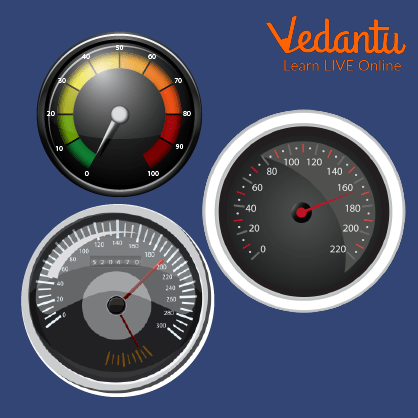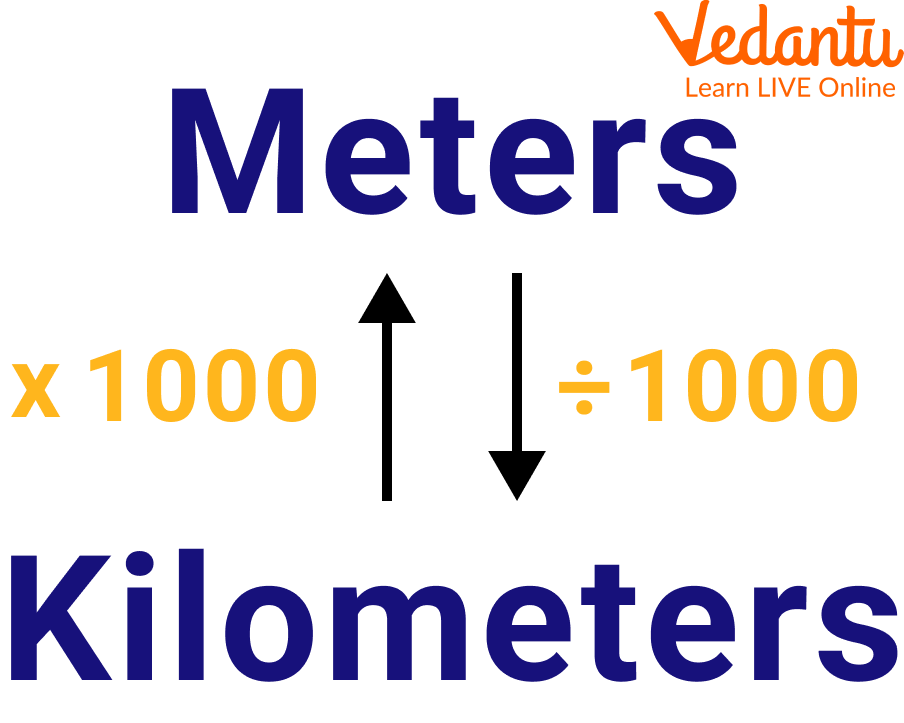




Easy Formula and Practice Questions for Speed Unit Conversion
Hello champs, you must have seen moving vehicles on the road, but, have you noticed different vehicles run at different speeds? Do you know how their speed is measured?
In this article, you will find all these answers and will be learning things that will help you to find accurate measurements of speed and time. The speed of the vehicle is measured in kilometers per hour. Conversion is important because suppose we are given a car which has a speed of 60 km/h and a bike with the speed of 220 m/s, so we need a uniform unit to compare them both.

Police Charging Fine for Crossing the Speed Limit
Converting Kilometer Per Hour to Meter Per Second
To convert a kilometer per hour measurement to a meter per second measurement, multiply the speed by the transformation ratio.
Since, one kilometer per hour = \[\dfrac{\text{1 km}}{1\,\text{hr}}=1\times \dfrac{\text{1000 m}}{60\times 60\,\sec }\]
$=\dfrac{1000}{3600}\text{m}\,\text{/}\,\text{s}$
$\text{=}\dfrac{5}{18}m/s$
So, we can say that to convert km/hr into m/sec, we multiply by $\dfrac{5}{18}$.
meters per second, you can use this simple equation to convert:
meters per second = $\mathrm{Kilometers per hour} \times \dfrac{5}{18}m/s$.
The speed in meters per second is equivalent to the kilometers per hour multiplied by $\dfrac{5}{18}$.
The meter per second is a SI unit of speed in the metric standard for measuring. Kilometers per hour can be abbreviated as km/h, and also some of the time abbreviated as kph. Also, 1 kilometer per hour can be written as 1 km/h or 1 kph.
How to Convert Sec to hr?
We know 1 second is equal to $\dfrac{1}{3600}$ hour
Hence, the Seconds to Hours Conversion Formula is given as
Hours = Seconds ÷ 3,600
As discussed above, similarly, we can convert hr to sec by the following formula-
Seconds = Hours × 3,600.
What is the Unit of Speed?
Meters per second is a SI unit of speed in the metric standard for measuring. It is the measurement of speed expressing the distance traveled in meters in a second.
Meters per second can be abbreviated as m/s, and are also abbreviated as m/sec. For example, 1 meter per second can also be written as 1 m/s or 1 m/sec.
Similarly, a kilometer per hour is also a unit of speed.
It can be abbreviated as km/h, and some of the time abbreviated as kph.
For example, 1 kilometer per hour can also be written as 1 km/h or 1 kph.
Kilometers per hour are a measurement of speed expressing the distance traveled in kilometers in an hour.

Speedometer (Used to Measure the Speed of a Vehicle in km/hr)
How to Convert km to m?

Conversion
To convert a kilometer measurement to a meter measurement, multiply the length by the transformation ratio.
Since one kilometer is equivalent to 1,000 meters, you can use this basic formula to convert:
meters = kilometers × 1,000
The length in meters is equivalent to the kilometers multiplied by 1,000.
For example, this is the way to convert 8 kilometers to meters using the formula above.
8 km = (8 × 1,000) = 8,000 m
Steps to Convert m Into Km
Step 1: For example, take 2,000 meters.
Step 2: Since one kilometer is equal to 1,000 meters, Divide it by 1,000.
Step 3: By doing so, 2,000 m = (2,000 ÷ 1,000) = 2 Km
Solved Examples
Q 1. Convert 54 km/hr to m/sec
Ans: We have 54 km/hr
= $54\mathrm{km/hr} \times \dfrac{5}{18}m/s$
= 15 m/sec
Q 2. The speed of the bicycle is 36 km/hr, what is its speed in m/sec?
Ans: Speed of bicycle = 36 km/hr
We know that to convert the speed into m/sec, we multiply by $\dfrac{5}{18}$
Therefore, speed of bicycle = $36\mathrm{km/hr} \times \dfrac{5}{18}m/s$
= 10m/s
Practice Questions
Q 1. Convert 36 km/s into m/s.
Ans: 10m/s
Q 2. Convert 54 km/s into m/s.
Ans: 15m/s
Q 3. Convert 10 km into m.
Ans: 10,000 m
Q 4. Convert 10,000 m into km.
Ans: 10 Km
Q 5. Convert 40,000 m into km.
Ans: 40 Km
Summary
In this article, we discussed the kilometer per hour, which is a SI unit of speed. To convert a kilometer per hour measurement to a meter per second measurement, multiply the speed by the conversion ratio. We multiply km/hr by $\dfrac{5}{18}$ to get data in m/sec. Km per hr is an example of the speed we measure while running a vehicle. At the end of the article, we added some practice questions, so after going through the article, give it a try to the practice questions.
FAQs on How to Convert Kilometer Per Hour (Km/hr) to Meter Per Second (m/s)
1. How to convert unit of speed?
To convert a unit of speed, multiply or divide the numerical value by the appropriate conversion factor between the units. For example, to convert from kilometres per hour (km/h) to metres per second (m/s):
- 1 km = 1000 metres
- 1 hour = 3600 seconds
2. How fast is 70 km in mph?
To convert 70 kilometres per hour (km/h) to miles per hour (mph), use the conversion factor: $$ 1~\text{km/h} = 0.621371~\text{mph} $$. Therefore, $$ 70~\text{km/h} \times 0.621371 = 43.496~\text{mph} $$ So, 70 km/h is approximately 43.5 mph. Vedantu’s interactive maths lessons provide step-by-step explanations for similar conversions and unit-related problems.
3. What are the units of speed?
The units of speed commonly used are:
- Metres per second (m/s): SI (International System) unit
- Kilometres per hour (km/h): Used for everyday speed, such as driving
- Miles per hour (mph): Used in some countries like the USA and UK
- Centimetres per second (cm/s) and other variations for specific contexts
4. What is 30 kmh 1 to ms 1?
To convert 30 km h-1 (30 kilometres per hour) to m s-1 (metres per second):
- Use the formula: $$ \text{Speed (m/s)} = \text{Speed (km/h)} \times \frac{5}{18} $$
- Calculate: $$ 30 \times \frac{5}{18} = 8.33~\text{m/s} $$
5. What is the difference between average speed and instantaneous speed?
Average speed is the total distance traveled divided by the total time taken: $$ \text{Average Speed} = \frac{\text{Total Distance}}{\text{Total Time}} $$ Instantaneous speed is the speed of an object at a specific moment in time. Vedantu’s live classes explain both concepts using real-life examples and interactive practice problems to help students better understand motion and speed measurements.
6. How can I convert speed from m/s to km/h easily?
To convert speed from metres per second (m/s) to kilometres per hour (km/h), multiply the value by 3.6: $$ \text{Speed (km/h)} = \text{Speed (m/s)} \times 3.6 $$ For example, 10 m/s = 36 km/h. Vedantu offers conversion tables and interactive calculators to help students practise such conversions efficiently.
7. Which unit of speed is most commonly used in physics problems?
The SI unit of speed—metre per second (m/s)—is most commonly used in physics problems. This unit ensures consistency in scientific calculations and measurements. Vedantu’s syllabus aligns with international standards and prepares students for advanced studies using SI units.
8. Why is it important to convert speed units in real-life applications?
Converting speed units is essential for:
- Understanding road signs and speed limits in different countries
- Interpreting data in scientific experiments
- Standardizing measurements for engineering, transportation, and aviation
9. How do I solve speed conversion questions in competitive exams?
To solve speed conversion questions in exams:
- Identify the initial and target units
- Use appropriate conversion factors (such as $1~\text{m/s} = 3.6~\text{km/h}$ or $1~\text{km/h} = 0.2778~\text{m/s}$)
- Show working for each step to avoid errors























